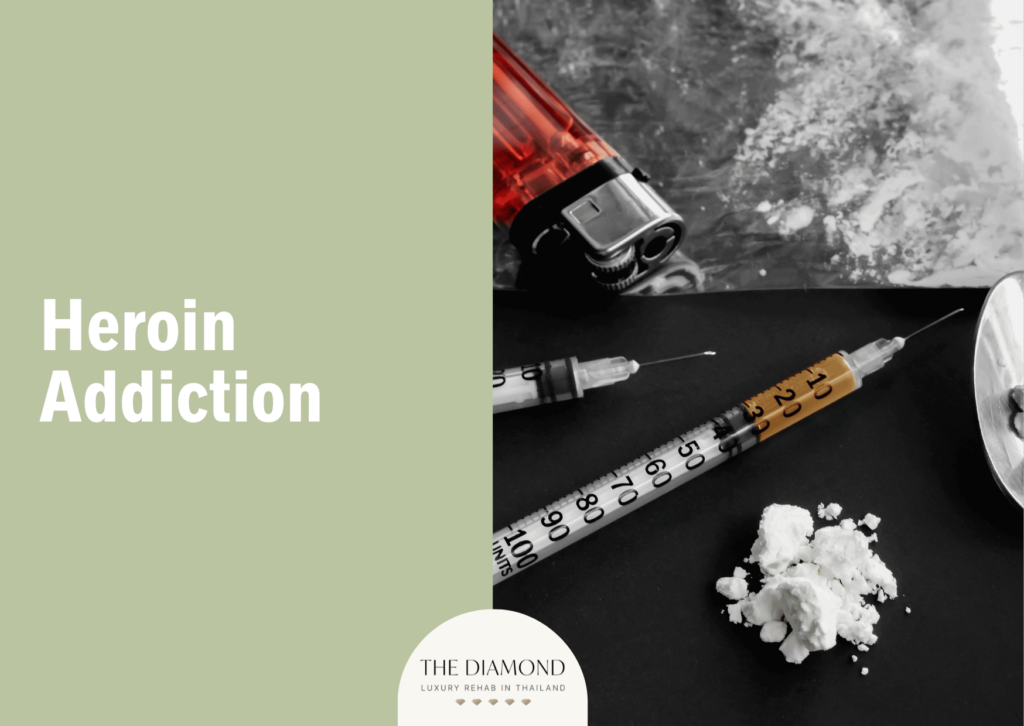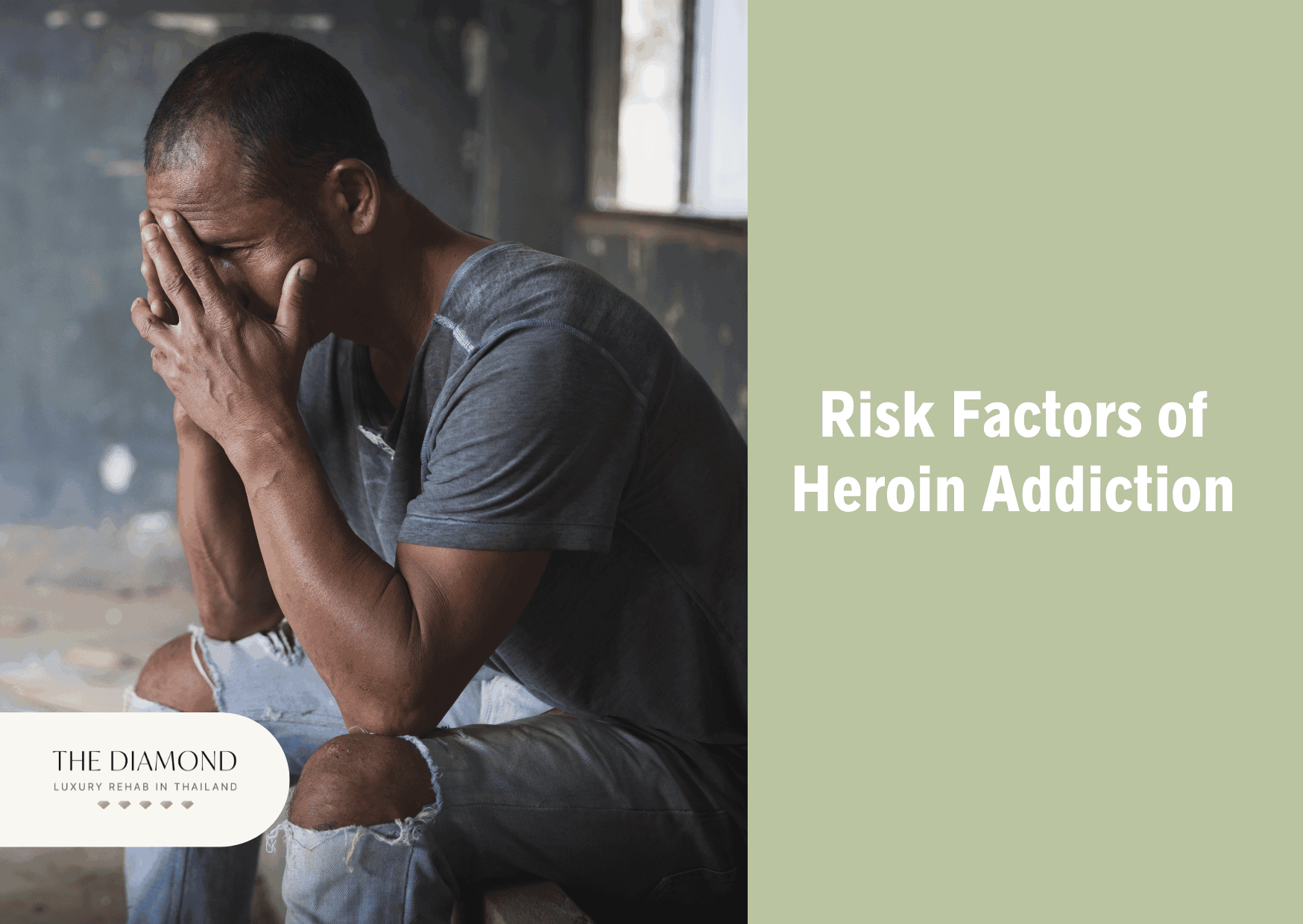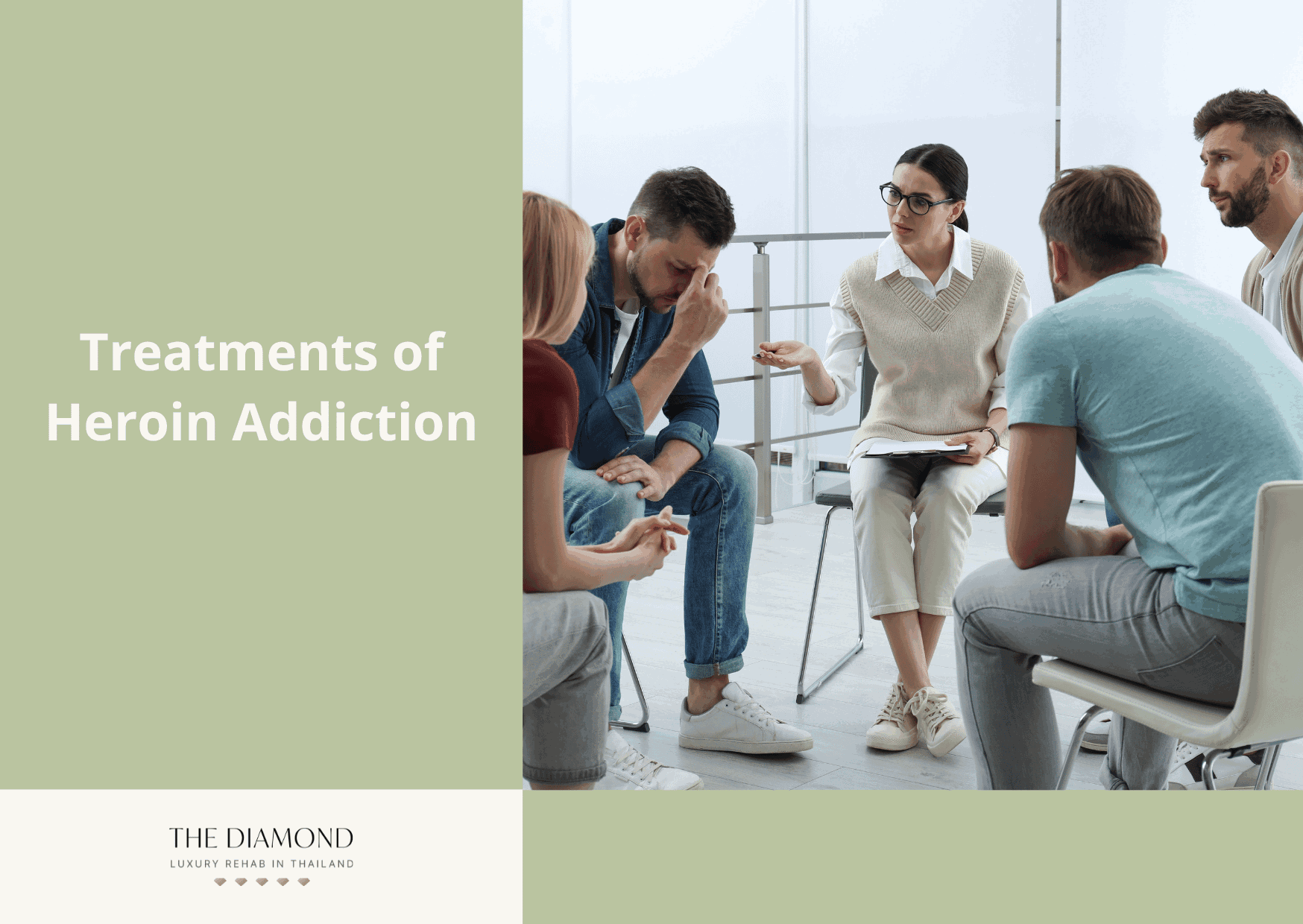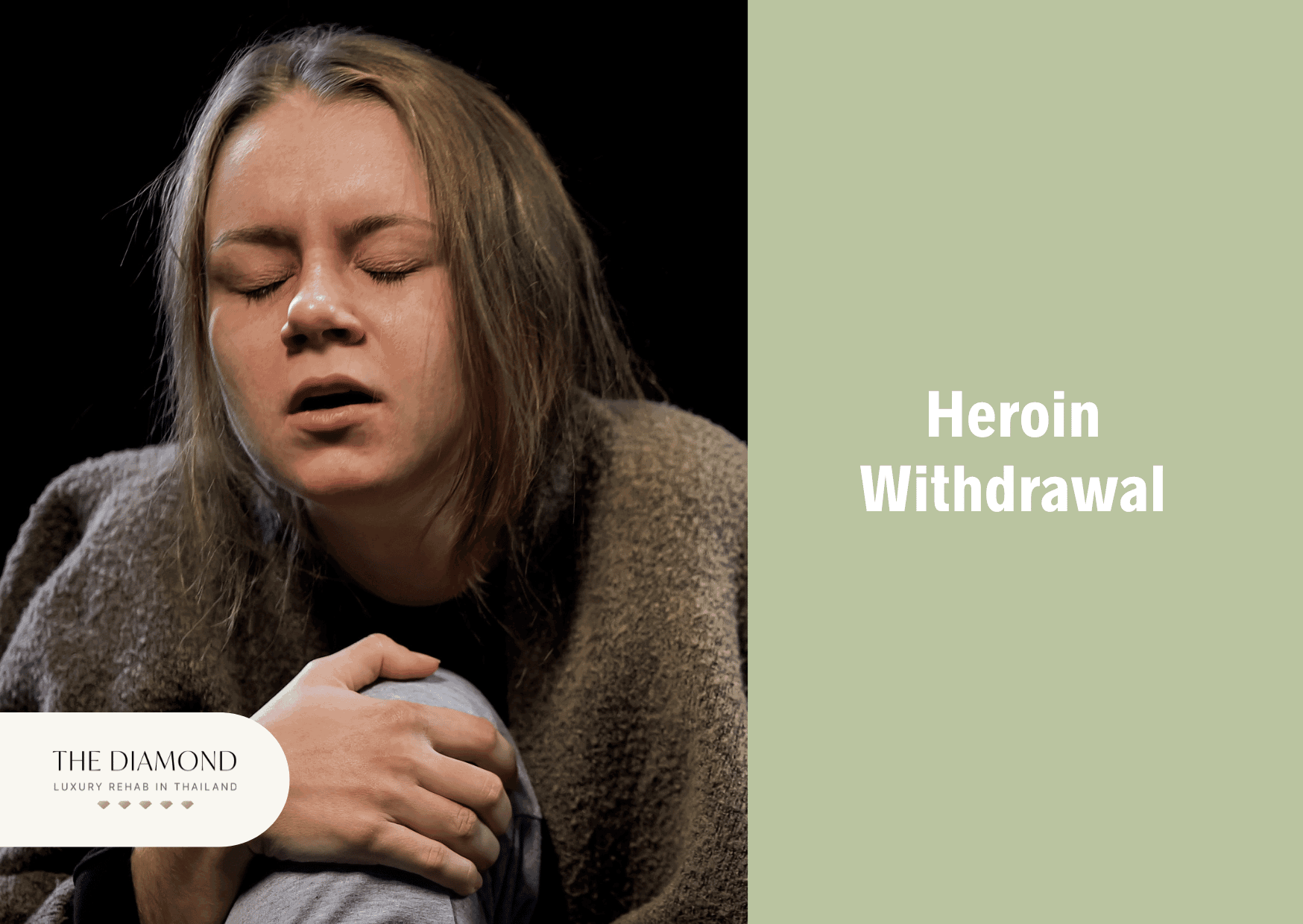Heroin addiction: signs, facts, statistics

Heroin addiction is defined as a chronic relapsing disorder indicated by the cycle of increased drug exposure followed by intermittent withdrawal episodes with or without abstinence and acute or chronic relapse.
In other words, heroin addiction refers to compulsive use of the drug regardless of the consequences it causes. Heroin is a powerful opioid made from morphine, a natural substance made from poppy seeds. For that reason, heroin is highly addictive.
Common causes of heroin addiction are genetics and environment-related exposure to the drug. A person is more likely to develop heroin addiction if they also have a family history of this problem. Peer pressure is another major risk factor.
The main symptoms of heroin addiction are strong cravings, withdrawal symptoms when a person doesn’t use the drug, and the inability to stop or take higher amounts to achieve the same effects. A heroin-dependent individual can develop many other symptoms that impair their social, physical, behavioral, and psychological well-being.
The biggest misconception about heroin addiction is that it’s enough to use the drug once only to become heavily addicted. In reality, the risk of addiction increases with repeated use. Even though heroin is highly addictive, this type of addiction can be successfully treated.
What are the effects of heroin?
The effects of heroin start with a surge of pleasurable sensation or a “rush” accompanied by skin flushing, heavy feeling in the extremities, and dry mouth. The rush from the intravenous use of heroin lasts around two minutes.
Some people may experience nausea, vomiting, and itching. Since heroin is a depressant, users may feel drowsy for several hours and notice their mental function is clouded. Heroin also slows down heart function and breathing rate. The latter can be life-threatening in some situations.
These effects occur because heroin, upon entering the brain, converts to morphine and quickly binds to opioid receptors. The high effect of heroin, as it travels through the bloodstream, can last four to five hours.
Keep in mind that tolerance to heroin builds quickly and leads to addiction and the risk of overdose. Symptoms associated with overdose to heroin include dry mouth, shallow breathing, discolored tongue, small pupils, slow pulse, and blue lips.
Why is heroin addictive?
Heroin is highly addictive because, like other opioids, it binds to receptors in the brain that release dopamine chemicals and endorphins. This drug has an intense impact on the brain’s reward system.
Under normal circumstances, the brain releases the above mentioned chemicals to reward behaviors that are necessary for survival, such as pain relief or eating. Since heroin is highly potent, the brain acts quickly and links heroin to the activation of dopamine and endorphins in the reward system.
The release of these chemicals produces pleasurable feelings, but they are temporary. As a result, a person takes the drug again hoping to experience the same effect. This leads to repeated use which results in tolerance, dependence, and addiction.
Manner of use also contributes to the addictive nature of heroin. Intravenous administration bypasses the digestive tract and leads to the rapid onset of heroin’s effects. On the other hand, oral intake takes more time to “kick in”.
What are the causes of heroin addiction?
The causes of heroin addiction can be environmental, genetic, and related to prescription opioids. There are many different things that can lead to heroin abuse, and they can be different for each person. The causes of heroin addiction are listed below.
- Environmental: The environmental causes of heroin addiction include exposure to the drug and family beliefs and attitudes.
- Genetic: Once a person starts using the drug, the development of addiction has a lot to do with genetics. A 2016 study on the genetic signatures of heroin addiction from the journal Medicine confirmed that heroin addiction has high heritability and identified four sets of genes associated with it, but also suggested that more research on this subject is necessary.
- Prescription opioids: Taking prescription opioids to alleviate pain may cause heroin addiction in some people. These pain-relieving medications work in similar ways as heroin and they are also addictive. A person who develops opioid addiction may switch to heroin because they’re unable to obtain the prescription-based medication any longer. In fact, around 80% of current heroin users started with opioids, according to a prescription opioids and heroin research report from the National Institute on Drug Abuse.
What are the risk factors of heroin addiction?

Risk factors of heroin addiction are similar to those associated with other substance use disorder, such as peer pressure, family conflicts, school, and mental problems, a 2003 study by Gjeruldsen et al., published in the Nordic Journal of Psychiatry confirmed.
Family history is a major risk factor for heroin addiction. This substance use disorder, like others, is more common in persons whose family members are, or have been, addicted to heroin. A combination of genetic predisposition and exposure to this addictive agent plays a role.
As mentioned above, peer pressure is also a factor here. A person, especially an adolescent or young adult, may give in to pressure from their social circle and start using the drug.
Other risk factors that increase the risk of heroin addiction include lack of support system from family or friends, starting using the substance at an early age, and having a mental health disorder. Depression, ADHD, PTSD, and other mental health disorders may pave the way to heroin addiction primarily because a person may use the drug to cope with symptoms or escape from emotions that trouble them.
How long does it take to get addicted to heroin?
There is no definitive answer to how long it takes to get addicted to heroin, as it varies from one person to another. While it is not likely a person will become addicted after the first use, it is important to keep in mind heroin is one of the most addictive substances in the world.
Several factors dictate how long it takes to develop an addiction to heroin. These factors include the amount used, frequency of use, current weight, and metabolism. The more frequently a person uses heroin, the more rapidly the brain and the nervous system adjust to the chemical changes, which may lead to addiction.
More precisely, repeated use leads to heroin addiction. A specific timeframe is nearly impossible to pinpoint primarily because every person is different.
What are the signs of heroin addiction?
Signs of heroin addiction can be of physical, psychological, social, or behavioral nature. The most common signs of heroin addiction are:
- Needing more heroin to experience the same desired effects
- Failed attempts to stop using heroin
- Craving or strong desire to use heroin
- Withdrawal symptoms when not using heroin
- Depression
- Euphoria
- Feelings of shame and guilt
- Poor judgment
- Disorientation and confusion
- Despair and hopelessness
- Difficulty concentrating or focusing
- Dry mouth
- Flushed skin, bruising, scabbing
- Nausea and vomiting
- Constipation
- Slow breathing
- Itching
- Loss of self-control
- Falling asleep suddenly and other sleep-related problems
- Memory loss
- Significant unintentional weight loss
- Social isolation and withdrawal from friends and family
- Financial and legal problems due to heroin addiction
- Ruined or strained relationships due to heroin addiction
- Socializing with persons who also use heroin or other addictive substances
- Mood swings and anger outbursts
- Impaired performance/productivity at work or school
- Loss of interest in activities or events that were previously important
- Wearing long-sleeved shirts to hide signs of IV heroin use, even in warm weather
What are the risks of heroin addiction?
The risks of heroin addiction can be short- and long-term. The most common risks of heroin addiction include:
- Pulmonary infection
- Kidney disease
- Liver disease
- Chronic constipation
- Collapsed veins
- Skin abscess or infection
- Heart infection
- Depression
- Increased HIV risk
- Increased hepatitis risk
- Miscarriage
- Low sex drive
- Female infertility
- White matter deterioration in the brain
What are the statistics about heroin addiction?
The statistics about heroin addiction reveal that this type of substance use disorder is common. The 2020 World Drug Report of the United Nations Office on Drug and Crime showed the global prevalence of opiate use in 2018 was 1.2% of the global population.
This accounts for 57.8 million people. The term opiates refer to heroin, pharmaceutical opioids, and opium. Some numbers also show around 13.5 million people worldwide take opioids including 9.2 million of those who use heroin. In North America, Australia and New Zealand, the Middle East, South Asia, and Southwest Asia the use of opiates is a lot higher than the global average.
As far as the United States is concerned, according to the heroin research report from the National Institute on Drug Abuse, about 902,000 people aged 12 or older reported using heroin in the past year, in 2020. In the same year, 691,000 people in the US from the abovementioned age group had a heroin use disorder.
The CDC Wide-ranging ONline Data for Epidemiologic Research (CDC Wonder) reports that in 2019 over 14,000 people died from heroin overdose meaning a third of all opioid-related deaths accounts for addiction to this drug. It is also estimated that 13,165 people in the U.S. died from a heroin-related overdose in 2020.
Heroin addiction has a harmful effect on the overall quality of life. Evidence shows that heroin-dependent persons have poorer wellbeing compared to nonusers, including lower-quality environmental, physical, social, and psychological aspects of life quality.
What are the treatments of heroin addiction?

Treatments of heroin addiction include behavioral and pharmacological measures. According to an article titled, “What are the treatments for heroin use disorder?” from the National Institute on Drug Abuse explains that both approaches aim to restore normalcy in a patient’s behavior and brain function.
This results in higher employment rates and reduced risk of criminal behavior, HIV, and other diseases. A combination of the two approaches is more practical than focusing on each of them individually, in cases of heroin addiction.
Pharmacological treatment revolves around the use of medications to reduce withdrawal symptoms during detox, ease cravings, and alleviate other physical symptoms that may lead to relapse otherwise. A common medication used for this purpose is lofexidine, an FDA-approved non-opioid medicine formulated to decrease withdrawal symptoms.
Medications used in heroin addiction treatment activate the same receptors as heroin. However, they are safer and less likely to cause addiction. Effective medications here include methadone (Methadose or Dolophine), an opioid agonist to prevent withdrawal symptoms, buprenorphine (Subutex) to alleviate cravings without producing the “high” effect, and naltrexone (Vivitrol), which blocks the action of opioids.
The behavioral approach refers to therapies and counseling sessions. The main goal of these sessions is to allow patients to work on their mental health, identify negative thought patterns and behaviors to replace them with more positive ones.
Besides individual therapies, patients can also attend family sessions, group sessions, couples counseling. Different types of therapies are used in heroin addiction treatment. These include cognitive-behavioral therapy and contingency management. These therapies enable patients to modify their expectations and behaviors.
During the heroin addiction treatment, patients also receive education and adopt skills they will need to resist triggers, maintain employment, and have a healthy and sober life.
How effective is rehabilitation in heroin addiction?
Rehabilitation is effective for heroin addiction treatment. It may be challenging because this drug is highly addictive, but rehabilitation helps patients on their journey toward sobriety.
One of the greatest rehabilitation benefits in heroin addiction is the individualized treatment plan to address specific needs and symptoms of each person. Patients get to identify and overcome underlying triggers and issues that lead to heroin addiction. They also learn skills to maintain their sobriety.
Rehabilitation provides much-needed structure and support that heroin-dependent persons need. Treatment puts a strong emphasis on daily routines and productivity as well as counseling sessions to keep patients engaged and without distractions. Rehabilitation center is also a place where a patient feels understood without being judged, which can aid in the recovery process.
Other reasons that add to the importance of rehabilitation include medical support, helping patients set goals and build new habits, putting emphasis on a healthy lifestyle, and patients receiving ongoing care and support.
Inpatient and outpatient programs are available in rehabilitation centers. Inpatient or residential programs are primarily created for persons with moderate to severe addiction, and where they are required to spend 60 to 90 days in a treatment facility.
The outpatient program refers to regular counseling sessions and support groups that a patient can attend, but doesn’t sleep in the facility. This kind of program is useful for persons who have completed inpatient treatment, but also for those whose addiction to heroin isn’t severe.
Who are the famous heroin addicts who overcame heroin addiction?
There are famous heroin addicts who have managed to overcome the disorder and lead successful lives. Famous heroin addicts who overcame heroin addiction include:
- Russell Brand: The English actor and comedian struggled with sex addiction and he’s also open about heroin addiction. Brand started using drugs at the age of 16 when he left his mother’s home and described his first experience with heroin as “blissful”. The comedian uses his experience with addiction to help others. In December 2021, he published a YouTube video to celebrate 19 years of sobriety.
- Robert Downey, Jr.: The popular Iron Man had a very public drug addiction problem that also included heroin. The actor was introduced to drugs and illicit substances at a young age by his father. He was eight years old then. From 1996 to 2001 Robert Downey, Jr. was in and out of jail and was making headlines with addiction to heroin and other substances. He got heroin addiction help, went into rehab in 2003, recovered successfully, and went on to become one of the most popular and beloved Hollywood celebrities.
- Steven Tyler: The lead singer of Aerosmith was notorious for heroin addiction, but also struggled with other substances. While being addicted to heroin, Tyler was still able to achieve worldwide success with his band. He hit rock bottom in 1988 when he also became the center of an intervention after which he went to rehab. The rehab stint was successful, but temporarily only. Although his road to recovery wasn’t easy, Steven Tyler is around 10 years sober now.
Can heroin cause withdrawal?

Heroin can cause withdrawal, defined as symptoms that occur when a person stops using the drug. Heroin withdrawal occurs in detoxification (detox), which is the first stage of the addiction treatment process.
Heroin withdrawal usually starts within six to 12 hours of the last dose. The peak of the withdrawal symptoms is in two to three days. Also, the duration of the withdrawal process ranges from five to 10 days.
A 2020 paper about new directions in the treatment of opioid withdrawal from the reputable journal Lancet reports that opioid withdrawal is an important clinical syndrome with the potential to cause significant discomfort. Withdrawal may also promote drug-seeking behavior and prevent people with this type of substance use disorder from receiving sufficient treatment.
Experiencing withdrawal is not the same for everyone with heroin addiction. The severity of withdrawal symptoms depends on various factors such as how long a person uses heroin, how they use it, and the amount of drug abuse. Duration of heroin withdrawal may also vary from one person to another.
Instead of euphoria and other effects of heroin intoxication, the withdrawal process induces opposite effects. For that reason, a person may have low mood, anxiety, and other symptoms described in the next section. While heroin withdrawal isn’t life-threatening on its own, some symptoms can have potentially lethal complications. For instance, depression may lead to suicidal thoughts and tendencies.
Considering the potential severity of withdrawal symptoms, detox is usually performed under medical supervision. A patient may also get medications that reduce the intensity of the withdrawal symptoms.
What are the signs and symptoms of heroin withdrawal?
Signs and symptoms of heroin withdrawal can range in intensity from mild to severe. The signs and symptoms of heroin withdrawal are listed below:
- Cravings for the drug
- Sweating
- Nausea and vomiting
- Diarrhea
- Abdominal pain
- Shaking
- Agitation
- Nervousness and restlessness
- Muscle spasms and/or aches
- Depression and anxiety
- Runny nose
- Tearing
- Chills
- Difficulty concentrating
- Fatigue
- Insomnia
- Rapid heart rate
- Hypertension (high blood pressure)
- Difficulty feeling pleasure
- Impaired respiration

